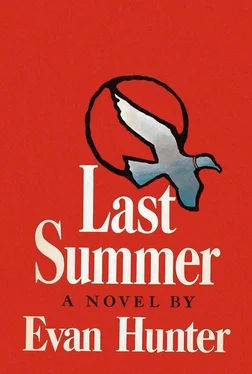“Oh, Peter,” he kept saying, over and over again. “Oh, Peter.”
I felt very strange that night. As if I was the father and he was the child. Very strange. Just “Oh, Peter,” over and over again.
Every time my father asked for another scotch that afternoon of the cocktail party, my mother threw him a little warning dagger, green eyes snapping off the knife with a quick flick, whap! , right between the shoulder blades. But my father always smiled back at her in a gracious and loving and absolutely sober-seeming way, his gray eyes crinkling and assuring her he would know when he’d had too much, which he rarely knew until he was falling-down drank and telling people once again that he was a connoisseur of good scotch. Everyone agreed that my father was just the most darling sweetest man in the whole world when he got drunk — except my mother. She called him a drunken pissing fool one night three summers ago while I was lying in my bed, without benefit of cuddly toy this time, being all of fourteen. That was the first inkling I had that perhaps my father drank a trifle too much at parties. The second inkling was in the city, when he drove the maid home after a party and nearly killed himself and her by ramming his Porsche into a lamppost. Everyone in the building knew that he had been drunk. I told the kids at school they were all crazy. That was when I was fifteen.
Last summer I was sixteen and serving drinks to guests at Sandy’s mother’s cocktail party, and trying very hard to keep my father from having one too many, which usually meant forty-four too many. I asked David to help keep the sauce away from him, but of course my father was a grown man capable of finding the bar all by himself, which he did with increasing regularity as the afternoon wore on. The Dynamiters, over constant threats of castration by Sandy’s mother, turned up their amplifiers full-blast and nearly blew everyone off the deck, for nothing had they been named so colorfully. Violet began dancing a fat lady’s version of the Frug, and most of the guests joined in, though hardly any of them knew what they were doing. The new dances are all on the upbeat, you see, and most people who learned to dance when my parents did are used to the downbeat, which is the one-and-three beat dominant in the Lindy and all of the other fast dances going all the way back to the Big Apple and the Shag and the Black Bottom, I guess. The Frug and the Monkey and the Watusi and all the other new ones, though, have the stress on the two-and-four beats, and it’s very difficult to explain that to people who were raised with the beat of another generation in their heads. So whereas some of them were very good dancers (Frankie, for example, had an excellent sense of rhythm and style as he danced with Violet, snapping his fingers and tossing his blond locks), they simply weren’t with the new beat; something looked wrong, distorted, off . I kept waiting for someone to say, “Let the kids do it; come on, kids, show us how to do it,” but they had the good grace not to. Besides, the three of us were very busy by that time, plying our way to and from the bar, coming out of the kitchen with hot little cheese patties, and chestnuts wrapped in bacon, and frankfurters with sharp delicatessen mustard, and beautiful tiny shrimp, and toasted little tortillas fresh from the oven, feeding the horde of hungry guests, most of whom seemed to have arrived expecting dinner, even though the invitations (which David and I had helped Sandy and her mother address and mail) had clearly stated Cocktails 3:00–7:00.
Mr. Caudell used a very heavy hand on the booze bottle, and a lot of the guests were beginning to get that six o’clock glassy-eyed look, including Sandy’s mother, who laughed too loud habitually, even when she wasn’t high, and whose laugh, I now realized, Sandy had imitated on the ferry ride home that night the townies tried to rape her. (We really didn’t know whether rape had been their intention, but we constantly referred to that night among ourselves as The Big Rape Scene.) It was Sandy who kept the flow of food coming from the kitchen, and a good thing too, because otherwise all those swilling islanders would have floated out to England on a sea of alcohol. When the sun finally went down, everyone turned to face the ocean, as though paying obeisance to a familiar deity. There were the usual “oooohs” and “ahhhhs” accompanying the sunset, the unvaried reaction that came every night of the summer, as though each successive sunset were a new and exciting experience instead of an identical replay of the one that had taken place the night before. The Dynamiters played right through the scintillating display out there on the horizon, blasting the deck and the house and the island itself with their own rendition of “Gloria,” Deuce wailing the words and Phil feebly bolstering him. The drummer was a good musician but a loud one, and the other members of the group kept turning up their amplifiers louder and louder in an attempt to drown him out, all in vain. As the music got louder and louder, as Mr. Caudell’s drinks got stronger and stronger, as the sky and the ocean and the beach and the deck got darker and darker, the guests got noisier and noisier, so that there was a cacophony of sound hanging on the night air, canopied by the distant silent stars and a full moon that brought, for an instant only, renewed sighs of “ahhhhh” and “oooooh.” The conversation was deafening, it bounced from the deck, it reverberated against the rear wall of the house, it threatened to obliterate even The Dynamiters’ detonations. “Sandra, you’re a nice little girl,” Mr. Matthews said, and put his arm around her and squeezed her. “Oh, thank you, Mr. Matthews,” Sandy said, “but I must see if anything’s burning in the kitchen.” Frankie said, “Yes, but the terrible truth of Pinter’s plays is exactly what makes them so excruciatingly human,” to which Mrs. Collins said, “But I think his people are horrible,” to which Stuart in one of his rare contributions said, “ All people are horrible, darling.”
“I adore these two boys,” Violet said, putting her fat arms around Frankie and Stuart. “I just adore them. We have no secrets from each other, do we, boys?” and Frankie said, “Not a secret in the world,” and Stuart merely nodded, looking pleased and embarrassed. Mr. Ogilvy, who was an editor at a publishing house said, “Yes, but try to understand the Negro’s viewpoint. If he is forced to become an expatriate in order to become a man, why should he cling to any fond memories of this country?” Agnes Bergman, who was a close friend of Sandy’s mother, said, “I’m sick of everybody always talking about the Negro. How about the white man, huh, how about him?” to which Mr. Ogilvy said, “You’d better get used to people talking about the Negro,” to which Agnes Bergman said, “Screw the Negro. I don’t have to get used to anything I don’t want to get used to,” and David asked her if she would like another drink.
Mr. Patterson, who was a television executive, said, “Yes, but why do you think kids today are experimenting with all this crap?” and Mrs. Anhelm, who ran a notions shop in Queens, asked, “Why?” Mr. Patterson, grateful for the cue, nodded and said, “I’ll tell you why,” and Mr. Mannheim, who taught speech and dramatics at Columbia University, said, “I deal with youngsters every day of the week.” Mr. Patterson said, “It’s rebellion,” and Mrs. Anhelm said, “It’s their sex drive, that’s what it is,” and a woman wearing high-heeled shoes and a black bikini over which she had thrown a lacy robe that looked like a peignoir, said, “I’m from St. Louis.” Mr. Patterson said, “They simply refuse to accept adult responsibilities.” Mr. Mannheim said, “You’d be surprised how many of them are smoking pot,” and Mrs. Anhelm said, “I once smoked Mary Jane at a party,” and the woman in the black bikini said, “It’s the Gateway to the West,” and Mr. Mannheim said, “Did it turn you on?” and Mrs. Anhelm said, “I only smoked half a joint,” and Mr. Patterson said, “They refuse to emulate,” and Mr. Mannheim said, “It isn’t hep to call it Mary Jane any more,” and the woman in the black bikini said, “Hip.”
Читать дальше


![Маргарет Миллар - Rose's Last Summer [= The Lively Corpse]](/books/384369/margaret-millar-rose-s-last-summer-the-lively-c-thumb.webp)









